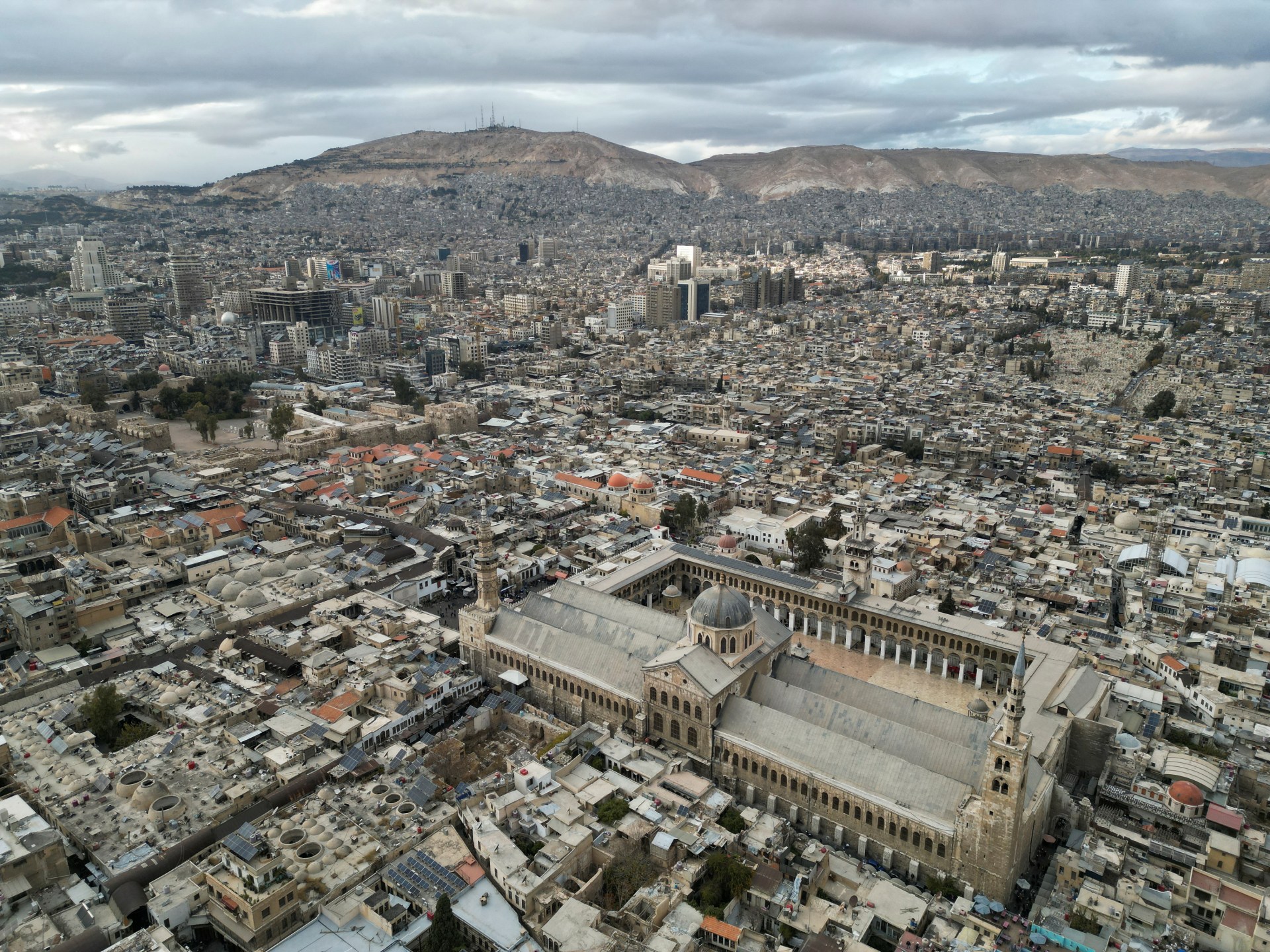Because it has always been the most strategically contested diplomatic hub in the Middle East, Syria is today the most dynamic diplomatic hub. Political trends in the Levant and the Middle East as a whole will be determined by the results of the conflict to control Syrian government and alliances for years to come.
Three concentric circles of domestic, regional, and global actors compete for power and influence in Syria because of the country’s unique position and status. It is a rare complete and consequential Arab country, due to its human and natural resources, strategic geography, and political, cultural, and ethnic ties in the Middle East and the world.
Syria today, even in its dilapidated state after half a century of autocratic abuse and 13 years of war, hosts hundreds of diplomats, businesspeople, civic activists, and carpetbaggers. This is not a new phenomenon, though.
Since Damascus and Aleppo emerged as productive, vibrant, and strategic urban centers in the third millennium BC, the people and rulers of the region of Syria have experienced this for the past 5, 000 years. Throughout recorded settled human history, the land and people of Syria have consistently generated knowledge, value systems, food, wealth, culture, technology, and identities that have made their land a strategic and coveted global crossroads.
A trip by land across Syria reveals overlapping networks of roads, forts, farms, water systems, and urban centres that have long serviced the east-west and north-south trade routes linking Asia, Europe and Africa. Along them stand Syria’s major entrepot cities – Aleppo, Damascus, Homs, Hama, Deir az-Zor, Palmyra, Deraa, Latakia, and others – that have played prominent roles in the country’s history. Diverse ethnic and religious groups coexisted in these strategic urban centres – Sunnis, Shia, Alawites, Druze, Christians, Armenians, Jews, Arabs, Kurds, Circassians, and a few others. They have coexisted throughout history by negotiating differences through formal and informal means of communication.
Syria has always been and continues to be unique because it is the most comprehensive Arab nation with all the benefits of true nationhood and statehood. These include fertile land and water resources, mineral and agricultural wealth, an industrial base, human wealth in skilled citizens, proficient managers, and entrepreneurial businesspeople, a pluralistic citizenry across vibrant and creative urban centres, alongside deeply anchored villages and rural settlements, a strong national and cultural identity, and, access by land and sea to the wealth and trade routes of three continents.
Due to its strategic geography and intrinsic wealth, it is also a powerful nation. Ancient and contemporary empires, including those in Greece, Rome, Persia, Byzantium, India, Britain, France, and Russia, have fought to rule Syria in an effort to protect its resources and significant cross-continental routes. Spend a few days at the Damascus Sheraton Hotel to get a sense of how everything works.
Syria is consequential in more ways than any other Arab nation, including modern Egypt and Gulf states with their energy-rich Gulf states, because it generates waves of emotion and identity that reflect what ordinary Arabs look for in order to fulfill both their human and civic aspirations. At various moments in the past century, these sentiments emanated from the realms of pluralism, constitutionalism, Islamism, anti-colonialism, and Arabism.
Syria is also important for people around the world to grasp because its experience reminds us in a single stroke of the entire modern Arab region’s strengths, weaknesses, failures, identities, and aspirations.
For millennia, “Syria” meant the bigger Greater Syria, or Bilad-el-Sham (“The Land of Sham”), which comprised most of the Levant and parts of the Fertile Crescent territories that are now Lebanon, Syria, Jordan, Israel, Palestine, and parts of Turkey and Iraq.
Following the fall of the Ottoman Empire, Franco-British imperial militarism, which prevented the establishment of a constitutional monarchy based in an elected assembly in 1920, cut short the term. Predictably, the colonial-engineered state experienced the same problems and vulnerabilities that characterize most modern-day Arab nations.
These include: anti-colonial resistance and a struggle for independence that never achieved full sovereignty, non-stop foreign military interventions, attempts at consultative and participatory decision-making that always ended in dictatorships and military rule, bouts of genuine development in education, healthcare, infrastructure, and economic growth that ultimately stagnated and deteriorated, due to corruption, mismanagement, and lack of accountability, and pluralistic societies that often succumbed to sectarian wars, stoked by external forces.
Today, many Arab and other citizens across our region follow Syria’s transformation with hope and admiration. We all want Syria to become the modern Arab world’s first self-determinant, citizen-validated, and truly democratic and sovereign state.
It is not lost on any of us that Syria’s current leadership emanates from Islamist groups who were battle-hardened in US-occupied Iraq and overthrew the regime of Bashar al-Assad with US, Israeli, Turkish, and other non-Syrian assistance. Our support for Syrians accomplishing their lofty objectives only grows as a result.
Regional and international powers that exert exerted pressure on the new Syrian leadership will use subterfuge, bribes, and weapons to ensure that the new Syria they form align with them. As has been the case in the past in this area, new authorities will likely face foreign-funded and inspired attempts to overthrow them if they refuse to.
In a way, Syria’s struggle for dignified, stable statehood today is the delayed culmination of the historic but quashed decade of mass Arab uprising for democracy, pluralism, and equal rights for all. As in 1920, Syria today examines whether external forces can permit its citizens to define themselves and set a precedent for the rest of the world. Because they have practiced for this purpose for 5, 000 years, the Syrians are the only Arab citizens who can accomplish this.
Source: Aljazeera

Leave a Reply